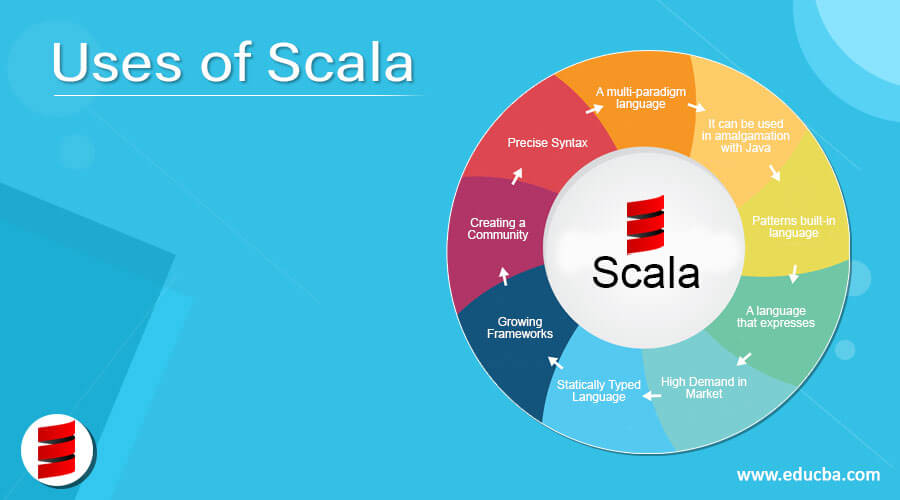Updated June 23, 2023
Introduction to Scala
Scala is a programming language used for functional programming and strong static systems. It is object-oriented, and it runs on JVM. It can interoperate with existing Java code and libraries. It is strongly considered a static type of language and does not have a concept of primitive data. Martin Odersky designed Scala and officially released it in June 2004. It has the strong point of being a multi-paradigm language that provides multi-core architecture. Scala’s main uses or applications and why it is popular are described below.
Top 10 Uses of Scala
Below is the list of the top 10 uses of Scala:
1. A multi-paradigm language
Scala supports object-oriented and functional programming paradigms and is a learning language. Learning this builds imperative, logical, functional, and OOP skills. You can easily explore both sides of functional and OOP together. Scala enables you to define different types associated with data and behavior attributes. Scala considers functions first-class, allowing you to pass values and supporting anonymous functions. This makes it elegant and is one of the biggest reasons for Scala becoming so popular in the market.
2. It can be used in amalgamation with Java
Scala runs on Java Virtual Machine (JVM). It depends on the person using Scala if they want to use Java. This inter-operability feature of Java is one of the best options in Scala. This enables Scala developers to use all libraries of Java directly from Scala code. It is also beneficial for Java developers as they can easily leverage their skills in Scala. It is also possible to call Scala code from Java, and the user can easily write any part of a program in Scala and the rest in Java. This feature enables a user to write code in Java and Scala and work with both languages.
3. Patterns built-in language
Scala was developed at Swiss University to create new research innovations in programming languages to mainstream languages like Java. This language already incorporates built-in best practices and patterns. In Java, you can easily overload variables and make them immutable. In addition to this, it also offers to adopt new languages like Python, Ruby, etc., to implement functional programming.
4. A language that expresses
Scala is a language that is inherently more expressive than Java. The developers who learn Scala after Java find writing code in Scala easier and more enjoyable. Let us see an example to get the beauty of this language compared to Java.
Code in Java:
Public class wordcount{
Public static void main(String [] args){
StringToken st= new StringToken(args[0]);
Map<String, Integer> map= new HashMap<String, Integer>();
while(st.hasMoreTokens()) {
String word= st.nextToken();
Integer count= map.get(word);
If(count == null)
map.put(word, count+1);
}
System.out.println(map);
}
}
Scala code:
Object WordCountScala extends App {
Println( args(0).split(“ ”).groupBy(x => x).map(t => t._1 -> t._2.length))
}The code in Scala is more precise and clean. It explains the code in a better way.
5. High Demand in Market
A developer needs to be in demand always. The main reason for using Scala is for better growth and job. Learning Scala will increase your demand and will make you even more marketable. Many companies, like Twitter, LinkedIn, Foursquare, etc., use Scala. Once you learn the uses of Scala, you can easily get the hike you are looking for. All investment banks and financial organizations will soon use Scala due to its scalable nature. There are many companies that share effective ways of uses of Scala. It will soon be the first alternative to Java.
6. Statically Typed Language
A statically typed language avoids code mistakes and helps programmers write proper code and debug the code easily. In dynamic languages, errors are visible only when you run a program. Uses of Scala provide the best of both static and dynamic languages. Despite giving a dynamic feel, Scala remains a strongly statically typed language. Scala provides type inference for variables and functions, much better than limited type inference in Java and C#. It also provides a compiler that uses type references to a full extent.
7. Growing Frameworks
Scala applications provide various libraries, enabling the creation of numerous frameworks. Many companies are working ahead to make Scala a mainstream language. Many frameworks have already come into existence, like Lift and Play. Another Scala-based framework, Akka, is concurrent and is established like a toolkit and runtime for building highly concurrent, distributed, and fault-tolerant systems. It also provides event-driven applications on JVM, a better platform.
8. Creating a Community
Scala can be said as a language that is growing fast, and lots of programmers are going to join the Scala bandwagon. Even developers who know Java are now moving to learn Scala. Developers are actively building numerous new libraries and frameworks based on Scala. Several IDEs are currently under development that provides superior support for Scala compared to Eclipse and IntelliJ. There are also reasons to use Scala because it is dynamic. In addition to this, Scala combines object-oriented programming and functional programming.
9. Precise Syntax
Another use of Scala is that it has a very precise syntax. Java has a very long syntax. Scala is more readable and concise at the same time. The Scala compiler called scalac can generate and work for better code like String(), equals(), etc.
10. Relatively easy to learn
Java programming finds it difficult to learn any functional language. Uses of Scala is easy due to its object-oriented functionality. Scala has clean syntax, nice libraries, and good online documentation, and many industry people use it.
Conclusion
Hence Scala has many uses once you learn it. It will surely increase your value as a developer in the market. You will be able to develop new frameworks and use the dynamic feature of this language. Scala, trending essentially worldwide, will reach new heights in your career.
Recommended Articles
We hope that this EDUCBA information on “Uses of Scala” was beneficial to you. You can view EDUCBA’s recommended articles for more information.




